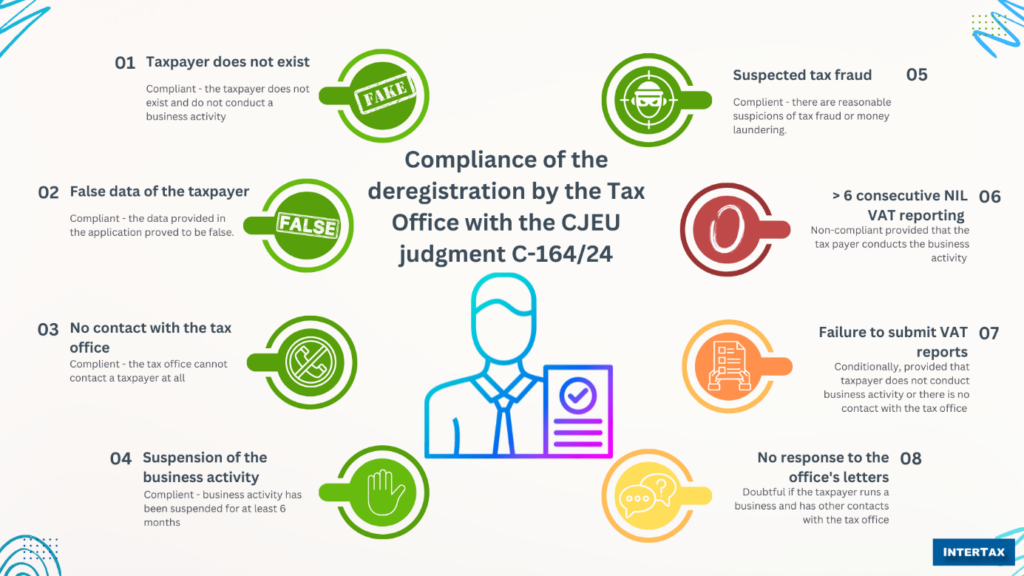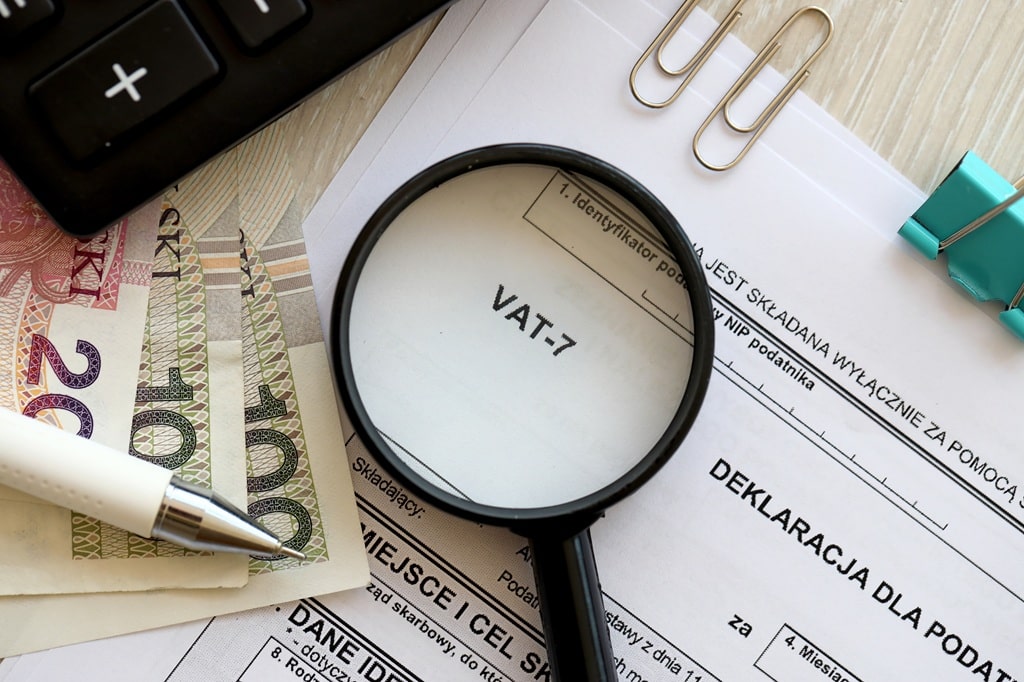Deregistration from the VAT register by the Polish tax office is a procedure that can have serious consequences for a business. In recent years, this practice has raised concerns, especially regarding the automatic removal of taxpayers who file so-called “NIL reporting.” A key ruling from the Court of Justice of the European Union (CJEU) on April 3, 2025 (Case C-164/24), sheds new light on whether these actions comply with EU law.
Legal grounds for VAT deregistration in Poland
According to Article 96(9) of the Polish VAT Act, the tax office can remove a taxpayer from the VAT register without informing them if:
- the taxpayer does not exist,
- the taxpayer data submitted during registration is false,
- the taxpayer submits only NIL VAT returns for at least of 6 consecutive months (or 2 quarters),
- the taxpayer does not file any VAT returns (JPK_V7) for 3 months (or 1 quarter),
- the taxpayer does not respond to tax office letters,
- there is no contact with the taxpayer (e.g. outdated address),
- the business has been suspended for at least 6 months,
- there are other legal reasons (e.g. suspicion of tax fraud).
CJEU ruling in Case C-164/24 – key conclusions
In Case C-164/24, the CJEU examined a preliminary ruling request concerning the compatibility of the automatic removal of taxpayers from the VAT register with Directive 2006/112/EC. The Court ruled that:
- Legislation which allows the tax authorities to remove a taxable person from the VAT register without providing for an obligation on the part of those authorities to examine fully the conduct of that taxable person in order to assess whether there is a risk to tax revenue and a likelihood of VAT fraud goes beyond what is necessary for ensuring the collection of all the VAT and combating VAT fraud.
- Without such a full examination of the conduct of the taxable person at issue, it is impossible to ascertain exactly the nature and the extent of any tax fraud committed by that taxable person and, consequently, to assess whether the removal of that taxable person from the VAT register constitutes an appropriate penalty for ensuring the collection of all the VAT and combating VAT fraud.
- The national tax authority must, when carrying out their inspection duties, conduct a diligent and impartial examination of all the relevant matters so that they can be sure that, when they adopt a decision, they have at their disposal the most complete and reliable information possible for that purpose.
- The principle of legal certainty requires the tax position of the taxable person, having regard to his or her or its rights and obligations vis-à-vis the tax authority, not to be open to challenge indefinitely
- A penalty consisting in the removal of a taxable person from the VAT register, without formally prohibiting the exercise, by that taxable person, of the activity subject to VAT, in respect of which that taxable person registered therein, is liable to lead to the tax situation both of that taxable person and of purchasers of goods and recipients of services supplied by that taxable person being constantly and repeatedly called into question. Therefore, such a penalty also cannot be regarded as consistent with the principle of legal certainty.
Are Polish rules consistent with the CJEU ruling?
Partially.
Polish law allows the tax office to deregister a business, for example, due to zero declarations, but this doesn’t always reflect whether the business is actually still operating. In light of the CJEU ruling:
- Filing NIL reporting cannot be the only reason for VAT deregistration if the taxpayer is still running a business.
- A business’s right to deduct VAT should not be denied just because of minor formal issues like not responding to letters,
- EU law requires that taxpayers must have a real chance to appeal the decision to remove them from the register.
- Automatic deregistration without reviewing actual business activity may breach EU law.
- A lack of response or contact alone should not be enough to justify removal, if the business is operating legally and has VAT rights.
The full judgement of the ruling is available here.

Recommendations for businesses
- Regularly check your VAT registration status to ensure you haven’t been deregistered without notice.
- Submit VAT returns, even if they’re NIL, if your business is still active.
- Keep your contact information up to date with the authorities.
- Respond to letters from the tax office – ignoring them may be treated as inactivity.
- If you are deregistered, submit a request for re-registration with justification, or file an appeal depending on your case.
Summary
The CJEU ruling in Case C-164/24 sends a strong message to Polish tax authorities: automatic VAT deregistration that ignores the real situation of the business is not allowed under EU law. Business owners should know their rights and obligations, and the tax office must apply the rules in a fair and proportionate way.

